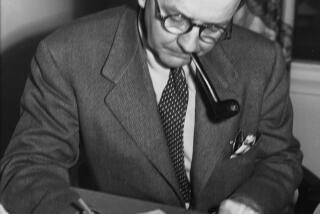Terry McMillan addresses affairs of the heart

“Who Asked You?” is Terry McMillan’s eighth book, and it is a corker: a long, smooth, Indian-summer cocktail. For all the racy, scandalous pleasures in books such as “Waiting to Exhale” and “How Stella Got Her Groove Back,” McMillan is a serious writer, the kind of novelist of whom the late John Gardner strongly approved (“true art is moral”). Her new book is rich in narrative tension, nuanced humor and moral heft absent from many a work of modern “literary fiction.”
“The problem with a lot of us is that we don’t have a moral compass,” McMillan says. “And we need one. We need one. Otherwise you would just do what you could get away with.”
She’s seated, straight back, dancer’s posture, in a big cozy chair in her new place, a lovely Pasadena penthouse that already feels like a home despite the boxes and boxes of books to be unpacked. She’s a beautiful, commanding woman; “magnetic” is the first word that comes to mind.
The new novel, “Who Asked You?” (Viking: 400 pp., $27.95), is a series of first-person narratives: At its center is Betty Jean Butler, a middle-aged woman, already in dire straits, who suddenly finds herself raising her troubled daughter Trinetta’s two sons.
We see Betty Jean through the eyes of all those around her — her grandsons and their mother; her husband, Lee David, who is afflicted with Alzheimer’s disease; her husband’s nurse, Nurse Kim; her best friend, Tammy, who lives across the street; her two unendingly infuriating sisters, Arlene and Venetia; her stuck-up son Quentin, a successful chiropractor; her son Dexter, who is in jail.
There’s a disarming, Dickensian pleasure not only in this rich, multifarious portraiture but also in the constant glints of humor, delight and plain weirdness that emerge in even the most terrible moments of Betty Jean’s story.
When I remark on the shocks I’d experienced as a reader of “Who Asked You?” — for example, the fate of Betty Jean’s son Quentin, whose marriage to the long-suffering Mindy hangs in the balance for most of the book — the author too expresses wonder and amusement at the behavior of her characters.
“I have no idea where this stuff comes from,” she says thoughtfully. “The thing is ... it’s not my story. That’s why I love writing in first person. I have to get lost.... And so I was sitting at that table, with Mindy. I was out there in San Francisco, on the wharf with Quentin and his little girl. I disappear.”
McMillan continues, “I create these profiles, and then I let them tell their story. I have, like, a little job application thing. I know their favorite color, if they’ve ever done anything they’re ashamed of, do they pay their bills on time.... What are you good at? … Have you ever been in love? You ever been to jail? I mean, I know these people.”
This technique is in general blisteringly effective, as for example in the case of Nurse Kim’s rundown of Harry Potter for the third-grader, Luther:
“It’s about wizards and magic and witchcraft, but when you get right down to it it’s about a little boy whose parents get killed,” Nurse Kim explains, who “ends up going to a special school sorta like a college for kids to learn how to use their magical powers...” Messed-up kids bully him, but “some of Harry’s friends try to help him out especially when the bullies try to steal this magical rock they ain’t got no business having. That’s where I am now. So, don’t bother me unless you can’t breathe, ‘cause I’m almost finished and please don’t tell your grandma I said those bad words.”
Like McMillan’s other books, “Who Asked You?” is deeply concerned with affairs of the heart. Its frankness about the passion of women — of their absolute need for a man in their lives — struck me as rather daring. Can a feminist admit to needing a man in 2013? Does it make a woman weaker, to need a man in her life? Her answer came instantly, delivered in a low, vibrant voice very like the one she produces on the page.
“No! There’s some things you just can’t control,” she insists. “Falling in love is one of them. It’s like ... your blood turns a different color. And you can’t do anything about it. As a woman, I don’t apologize for any of it. None of it. And I don’t really care what people think of what I do, as a woman and a human being.... I trust my instincts. And I don’t allow people who judge me to get away with it. I don’t let it weigh me down.”
McMillan follows this with a smile as radiant, spontaneous and infectious as a teenager’s. It’s the same feeling you’re liable to get from reading her new book.
Bustillos is a writer in Los Angeles.
Terry McMillan talk and signing
Where: Museum of African American Art, 4005 Crenshaw Blvd., Los Angeles (third floor of Macy’s)
When: 6 p.m. Friday, Sept. 27
Price: Free
Contact: esowonbookstore.com/event
More to Read
Sign up for our Book Club newsletter
Get the latest news, events and more from the Los Angeles Times Book Club, and help us get L.A. reading and talking.
You may occasionally receive promotional content from the Los Angeles Times.






